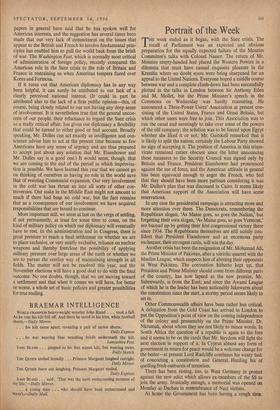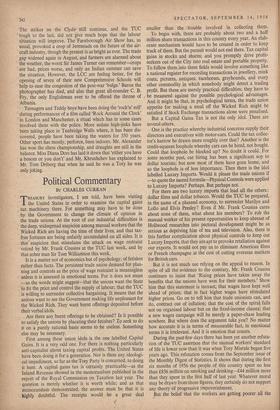Portrait of the Week
THE week ended as it began, with the Suez crisis. The recall of Parliament was an expected and obvious preparation for the equally expected failure of the Menzies Committee's talks with Colonel Nasser. The return of Mr. Menzies empty-handed had placed the Western Powers in a dilemma that must have caused exquisite pleasure in the Kremlin where no doubt nyets were being sharpened for an appeal to the United Nations. Everyone hoped a middle course between war and a complete climb-down had been successfully plotted in the talks in London between Sir Anthony Eden and M. Mollet, but the Prime Minister's speech in the Commons on Wednesday was hardly reassuring. He announced a Three-Power Users' Association at present con- sisting of the United States, France and Great Britain, but which other users were free to join. This Association was to run the canal and seemingly to take over some of the powers of the old company; the solution was to be forced upon Egypt whether she liked it or not; Mr. Gaitskell remarked that it is likely to split the nation; certainly the Labour Party showed no sign of accepting it. The position of America in this trium- virate remained rather obscure since the letter announcing these measures to the Security Council was signed only by Britain and France. President Eisenhower had pronounced against the use of force, and the American attitude in general has been equivocal enough to anger the French, who feel that they should have been more partisan considering it was Mr. Dulles's plan that was discussed in Cairo. It seems likely that American support of the Association will have some reservations.
In any case the presidential campaign is attracting more and more attention over there. The Democrats, remembering the Republican slogan, 'As Maine goes, so goes the Nation,' but forgetting their own slogan. 'As Maine goes, so goes Vermont,' are buoyed up by getting their first congressional victory there since 1934. The Republicans themselves are still noisily con- fident that President Eisenhower and an enormous party exchequer, their strongest cards, will win the day.
Another crisis has been the resignation of Mr. Mohamad Ali, the Prime Minister of Pakistan, after a vitriolic quarrel with the Muslim League, which suspects him of abetting their opponents in West Pakistan. The convention hitherto kept up, that President and Prime Minister should come from different parts of the country, has now lapsed as the new premier, Mr. Sulwawardy, is from the East; and since the Awami League of which he is the leader has been noticeably lukewarm about the constitution since the start, a stormy period seems likely to set in.
Other Commonwealth affairs have been rather less critical. A delegation from the Gold Coast has arrived in London to put the Opposition's point of view on the coming independence of the colony and presumably on the Prime Minister, Dr. Nkrumah, about whom they are not likely to mince words. In South Africa the question of a republic is again to the fore and it seems to be on the cards that Mr. Strydom will fight the next election in support of it. In Cyprus almost any form of government in return for peace would be a welcome change for the better—at present Lord Radcliffe continues his weary task of concocting a constitution and General Harding his of quelling fresh outbursts of terrorism.
There has been rioting, too, in West Germany in protest against the new edict which allows ex-members of the SS to join the army. Ironically enough, a memorial was opened on Monday at Dachau in remembrance of Nazi victims.
At home the Government has been having a rough time. The strikes on the Clyde still continue, and the TUC tough to the last, did not give much hope that the labour situation will improve. The Farnborough Air Show has, as usual, provoked a crop of Jeremiads on the future of the air- craft industry, though the present is as bright as ever. The trade gap widened again in August, and farmers are alarmed about the weather, the worst Sir James Turner can remember—crops are bad, prices worse, and only an Indian summer can save the situation. However, the LCC are feeling better, for the opening of seven of their new Comprehensive Schools will help to ease the congestion of the post-war 'bulge.' Baron the photographer has died, and also that great all-rounder C. B. Fry, the only Englishman ever to be offered the throne of Albania.
Teenagers and Teddy boys have been doing the `rock'n' roll' during performances of a film called 'Rock Around the Clock' in London and Manchester, a ritual which has in some cases involved them with the police. More sedate high-jinks have been taking place in Tunbridge Wells where, it has been dis- covered, people have been taking the waters for 350 years. Other sport has mostly, perforce, been indoors. Mr. Alexander has won the chess championship, and draughts are still in the balance. Miss Diana Dors has laid it down that 'either you have a bosom or you don't' and Mr. Khrushchev has explained to Mr. Tom Driberg that when he said he was a Tory he was only joking.



































 Previous page
Previous page